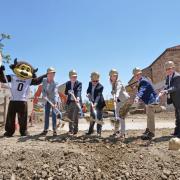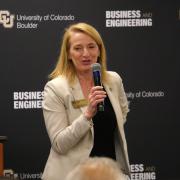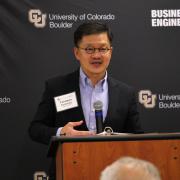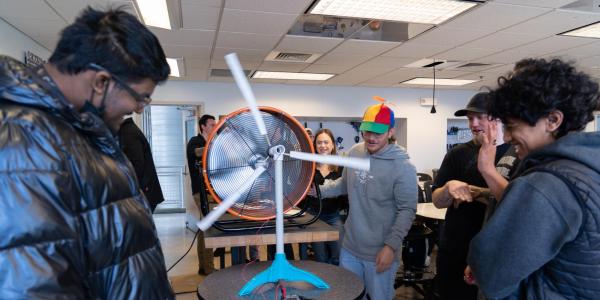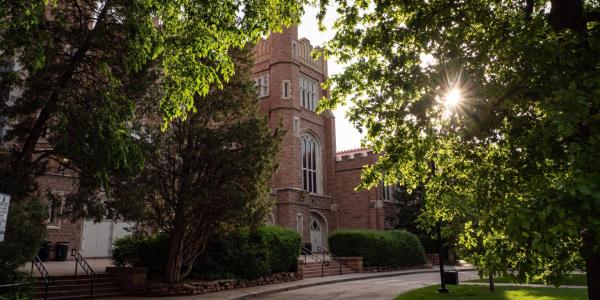Banner image: From left, CU Regent Lesley Smith, Provost Russell Moore, donor Tandean Rustandy, Business Dean Sharon Matusik, Engineering Dean Bobby Braun and Chancellor Philip DiStefano. (Credit: Casey A. Cass/CU Boulder)
Business and engineering leaders, donors, students and corporate partners Wednesday celebrated the official groundbreaking of a new $45 million addition that will physically connect two CU Boulder academic and research powerhouses in a way they’ve never been connected before.
As of 2020, the Koelbel Building, which houses the Leeds School of Business, will be physically connected to the College of Engineering and Applied Science complex.
Pending approval by the CU Board of Regents, the new building will be named after Leeds alumnus and donor Tandean Rustandy.
Rustandy is one of the top CEOs in the Republic of Indonesia and a first-generation college student who has long supported CU Boulder’s efforts to foster entrepreneurship, innovation and collaboration. With this $5 million gift to the new building, Rustandy has gifted more than $10 million to the university.
Being a top university for innovation is a strategic imperative for the CU Boulder campus.
“Merging two top business and engineering programs to create a higher standard of learning and impact in the world is the legacy that we should aspire to leave,” said Rustandy, a 1987 Leeds graduate and founder and CEO of the Jakarta-based PT Arwana Citramulia Tbk, one of the world’s largest ceramic tile manufacturing companies.
“All of this shows that nothing is impossible if you put your mind to it: That someone like me, who came from nothing, can make an impact like this in the world,” he added. “Success is not about power or wealth, but about how much impact you can create.”
The new expansion will feature:
- An innovation and entrepreneurship hub
- Four state-of-the-art active learning classrooms
- A 200-seat high-tech auditorium and event space
- Renovated business library
- High ceilings, natural light and stunning views of the Flatirons
As shovels plunged into the dirt, participants in the groundbreaking ceremony marveled at the work that has already been accomplished since site work began in March.
The 45,000-square-foot addition will be a lot more than a way to stay out of the snow and rain when moving between buildings: It will feature an innovation and entrepreneurship hub where students from any discipline can collaborate with faculty and local business leaders to explore new ideas that lead to the next innovation that can positively impact humanity. It will also have a new 200-seat auditorium.
“This building connection symbolizes what is increasingly important to higher education in the future—working across disciplines, while putting entrepreneurship and innovation at the center of our efforts,” said Leeds Dean Sharon Matusik. “Together, our two top-ranked and globally recognized programs will collectively realize the potential that curricular, co-curricular and programmatic collaboration creates.”
Engineering Dean Bobby Braun added that a permanent hub to support entrepreneurial collaborations will help create the jobs of the future.
“Our students need more than technical knowledge to impact today’s increasingly complex society,” Braun said. “Our recent growth in entrepreneurial activities, built upon expanding partnerships across campus and the state, demonstrates the value of well-rounded students with critical thinking skills and hands-on expertise.”
The new addition also features four 90-seat active-learning classrooms to foster collaboration and experiential learning, including one that also converts to an event space.
A reorganization of the William M. White business library will enhance services and provide more efficient study spaces. Renovated spaces, meanwhile, will also receive significant building systems and energy efficiency upgrades.
The new addition will be built to LEED Gold standards for sustainability. The architect for the project is Anderson Mason Dale Architects, the firm that designed the striking Westin Denver Airport hotel in addition to some buildings at CU Boulder, including the Institute of Behavioral Science and Benson Earth Sciences. Haselden Construction is the general contractor.
The project, which also includes 29,000 square feet of renovated existing space, is slated for completion in December 2020 and is funded largely through philanthropy.
“Breaking down barriers between academic units is the strategic direction for our campus,” said Provost Russell Moore. “The use of this combined space, by students who will come to us from all over the world and who will study a variety of subjects within business and engineering, will multiply their potential as graduates, the potential of the academic programs they will participate in, and CU Boulder’s potential overall.”

